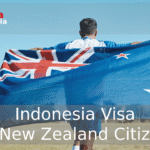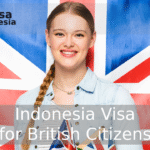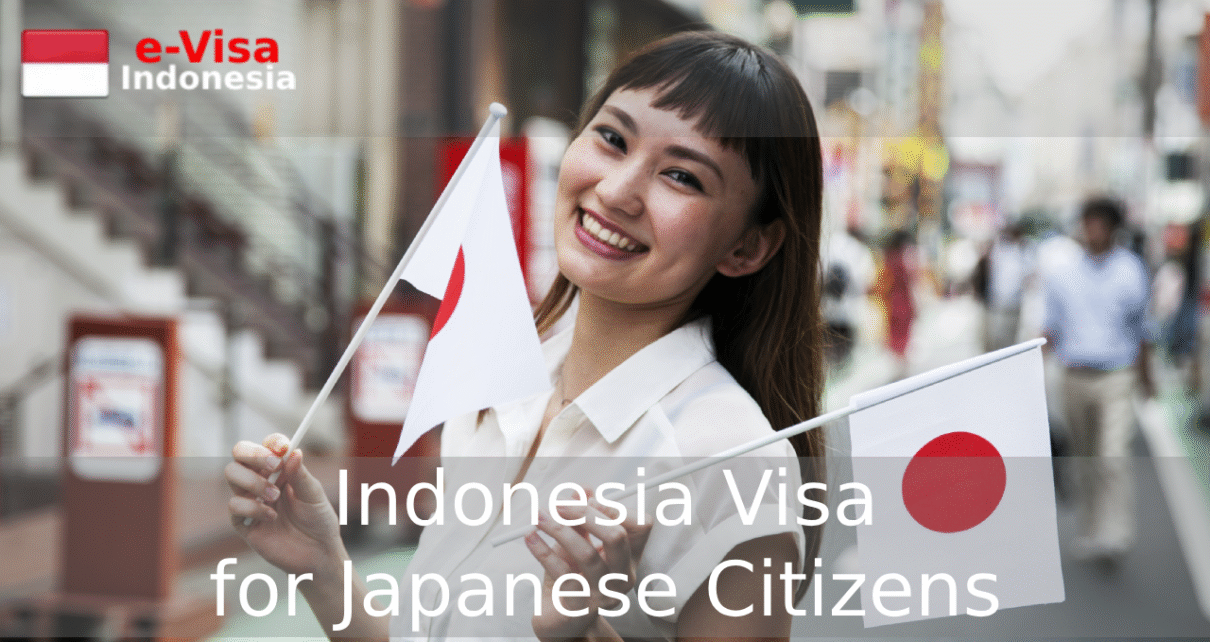
Japanese citizens need a visa to visit Indonesia. The most common types are the B1 Visa on Arrival and the C1 Electronic Visa. Applications can be completed online, requiring a valid passport and supporting documents.
Japanese nationals must complete the Indonesia visa form, attach the necessary files, cover the associated fee, and wait for the processing period to be completed.
When it comes to the validity and stay period, it varies depending on the type. For example, the B1 Tourist Visa on Arrival is valid for 90 days from the date of issue and allows the Japanese to stay in Indonesia for up to 30 days.
On the other hand, the C1 Tourist Single-Entry Visitor Visa is also valid for 90 days from issuance but grants a longer stay of up to 60 days in Indonesia.
In addition to a visa, a valid passport is required for entry into Indonesia. It must be valid for at least 6 months beyond the date of arrival in the country.
TIP: For more information, Japanese citizens should contact the nearest Indonesian Embassy or Consulate. They will provide the latest updates and guidance regarding visa regulations.
Types of Indonesian Visas
Indonesia offers a variety of visa options for different trip purposes. Among the most popular permits are the B1 and C1 visas, which are ideal for Japanese travelers visiting Indonesia for tourism or to spend time with friends and family.
Tourism
Visas to Indonesia for tourism are designed to accommodate short-term stays and provide a straightforward possibility for those looking to experience Indonesia.
B1 Tourist Visa on Arrival
The e-VOA B1 is ideal for short-term visitors from Japan planning a vacation or conducting light business activities in Indonesia.
It is designed for purposes such as leisure, family visits, or limited business engagements like meetings.
This visa is valid for 90 days, allows a 30-day stay, and can be extended for an additional month at designated immigration offices in Indonesia.
The entire application process is handled online for added convenience; you only need a passport and an outbound ticket. To save time and avoid queues at Indonesian airports, it is a perfect option.
C1 Tourist Single-Entry Visitor Visa
This visa is designed for Japanese citizens who want a more extended visit for purposes such as tourism, visiting family or friends, or attending meetings/conferences.
The visa enabling entry to Bali (and thus Indonesia) permits a stay of up to 60 days within a 90-day validity period and can be extended if needed.
Japanese applicants must provide a passport with at least 6 months of validity, a recent color photo, and a bank statement showing a minimum balance of USD 2000 over the last 3 months.
Other Visa Types for Indonesia
Besides tourism, Indonesia offers a range of visa types designed to support different travel purposes, including business, study, work, family visits, and more:
- Government & Business: Granted to representatives on official assignments, diplomatic visits, or those attending corporate meetings, trade negotiations, or investment discussions. These visas support short-term official or commercial endeavors without employment rights.
Examples: C2 Business Visa, C10 Business Event Visa, D12 Pre‑Investment Visa - Crew: Designed for international crew members serving on commercial ships, airlines, or cruise liners operating in Indonesian territory.
Examples: A36 Visa Exemption (Foreign Crew), A37 Visa Exemption (Foreign Crew), C13 Foreign Crew Visa - Work & Training: Issued to foreign nationals participating in time-bound professional activities such as training, internships, film projects, or voluntary work in Indonesia.
Examples: C16 Training Visa (Invited Trainers), C22 Internship Visa, E35 Work and Tour Visa - Study & Education: Offered to students, scholars, and researchers engaging in formal education, academic exchanges, language studies, or short-term training programs.
Examples: E30A Student Visa, E30B Education Visa, C9 Study Visit, Courses & Training Visa - Family: Enables foreign nationals to reside in Indonesia with their immediate family members, supporting family reunification and domestic stability for legal residents or citizens.
Examples: E31B Family Visa (Spouse of ITAS/ITAP Holders), E31C Family Visa (Children of Indonesian Parent), E31G Family Visa (Parents) - Former Indonesian Citizens: Created for ex-Indonesians and their close relatives, allowing them to visit or resettle in the country with simplified procedures and longer stays.
Examples: E32B Visa for Former Indonesian Citizens (1st & 2nd Degree), E32C Visa for Former Citizens (Max Stay 2 Years), E32D Visa for Former Citizens (Max Stay 1 Year) - Investment: Aimed at foreign investors seeking to establish or expand business operations in Indonesia. These visas facilitate business setup, capital placement, and long-term commercial residency.
Examples: E28A Investment Visa, E28B Investment Visa (Company Establishment), E28C Investment Visa (Non‑Company Establishment) - Long-Term & Special Stay: Suitable for retirees, remote professionals, and globally recognized individuals planning an extended stay in Indonesia for personal, professional, or lifestyle reasons.
Examples: E33C World Figure Visa, E33E Elderly Visa, E33G Remote Worker Visa - Medical: Available to individuals traveling to Indonesia for planned health services, specialist consultations, or extended medical treatment.
Examples: C3 Medical Treatment Visa, D3 Medical Treatment Visa, E33G Medical Visa - Culture, Arts & Media: Issued to those participating in artistic events, cultural collaborations, media productions, or journalistic coverage in Indonesia.
Examples: C7 Art & Cultural Activity Visa, C7A Music Performance Visa, D7 Art & Cultural Activity Visa - Sports: Reserved for athletes, sports officials, and trainers attending sporting events, competitions, or professional training sessions.
Examples: C8B Sports Visa (Officials), D8A Sports Visa (Athlete), D8B Sports Visa (Officials) - Other Special Visas: Covers special circumstances such as legal proceedings, religious missions, inspections, or humanitarian work not addressed under other categories.
Examples: C21 Judicial Proceeding Visa, C10A Preacher Visa, C17 Business Visa (Audit & Inspection)
Indonesia Visa Requirements for Japanese Citizens
Japanese citizens visiting Indonesia must prepare the necessary documents according to the type of visa they are applying for. Ensuring that all requirements are met will help avoid delays in the application process.
The general documentation includes:
- Passport: Must be valid for at least 6 months from the intended date of arrival in Indonesia.
- Photograph: A recent color photo with a clear, neutral expression.
- Additional Documents: These depend on the visa category. For example, a Tourist Visa may require proof of accommodation and a return flight ticket, while a business visa might call for an official invitation letter from an Indonesian company.
Japanese are advised to carefully review the specific conditions for their selected visa type before submitting their application.
Indonesian Visa: Application Process
Getting an Indonesian visa has become more streamlined, especially with the introduction of online visa platforms.
Japanese citizens must follow a few simple steps to complete the visa process online without the need to visit the embassy or consulate:
- Visit https://evisa.imigrasi.go.id/ and select “Apply” to begin.
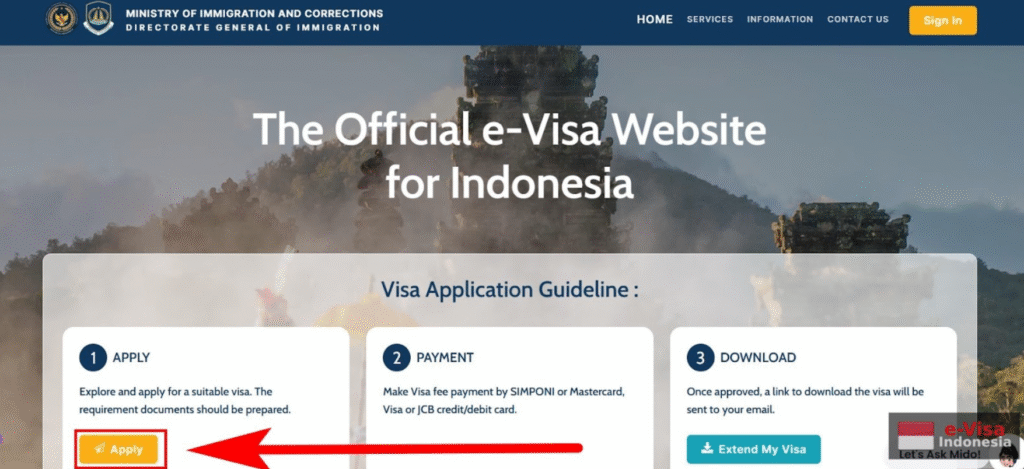
- Choose Japan from the passport country dropdown list.
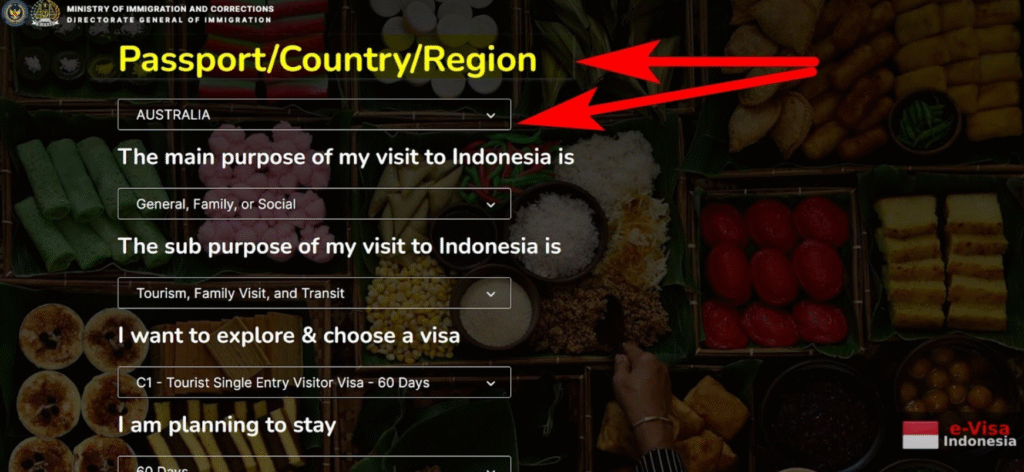
- Select the main reason for your travel and the specific sub-purpose of your visit.
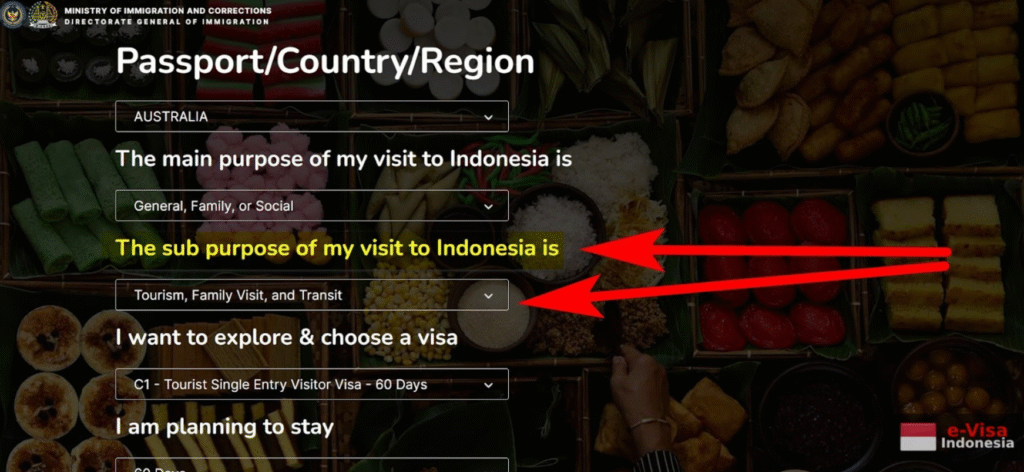
- Identify the correct visa type based on your selections.
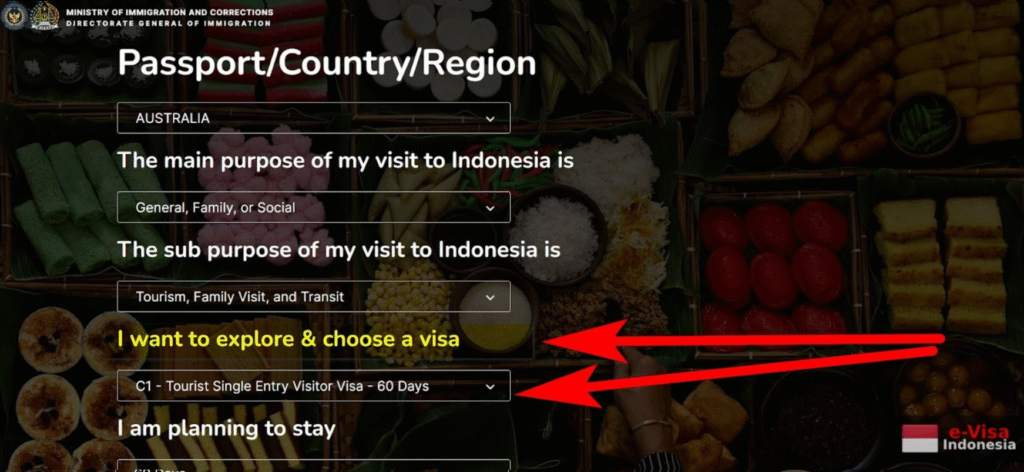
- Click “Detail and login” to continue.
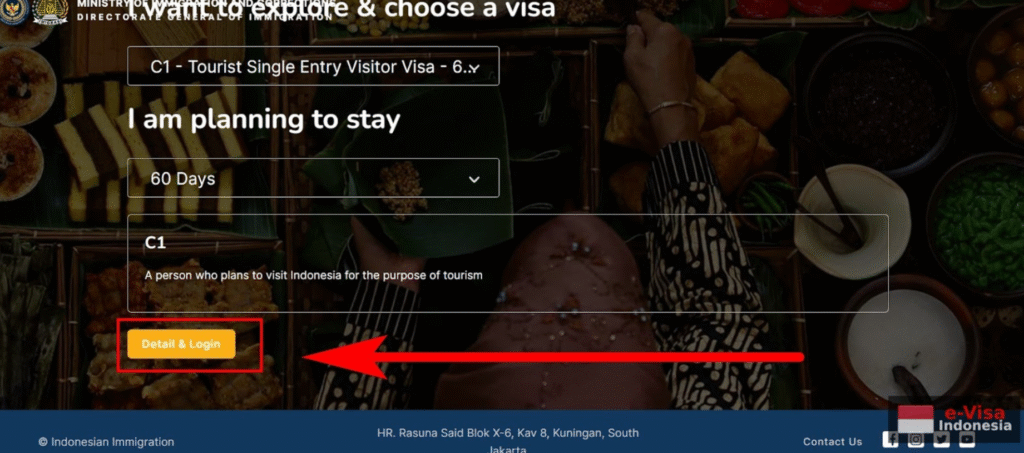
- Confirm all visa information and press “Apply”.
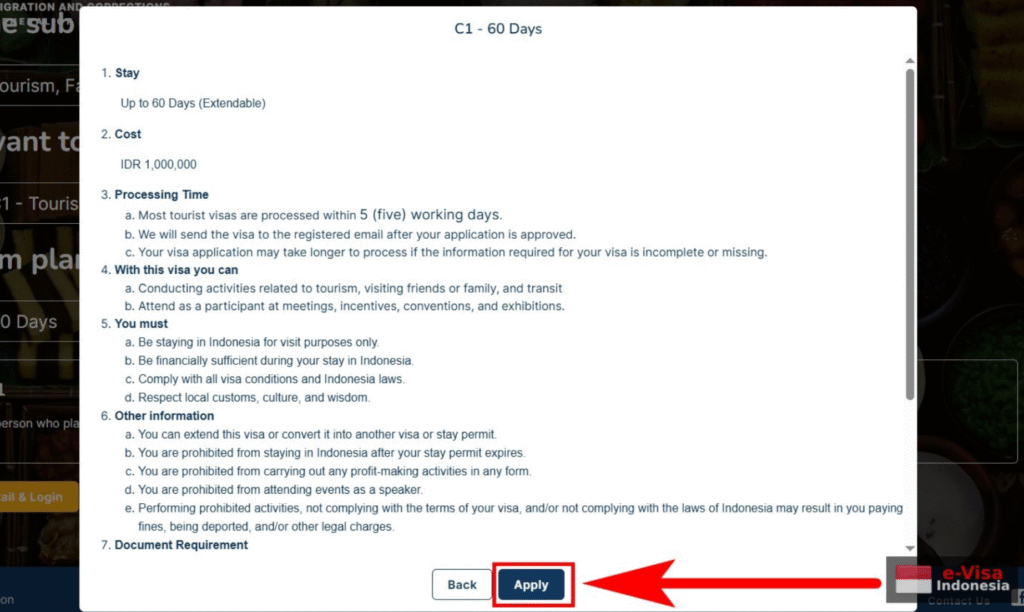
- Ensure you’re applying for yourself, not on someone else’s behalf.
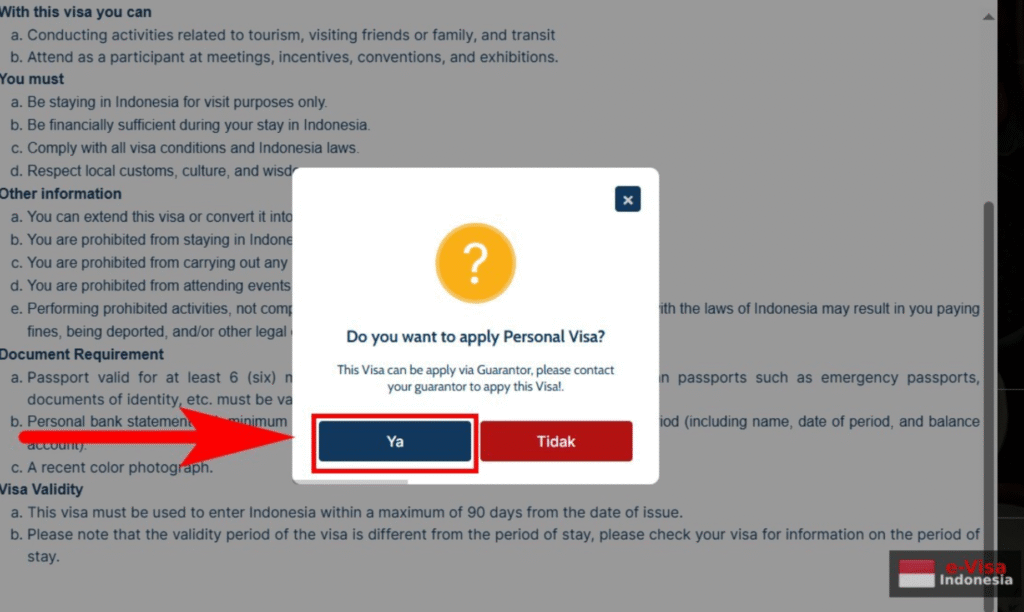
- Sign in or create an account as a Foreigner.
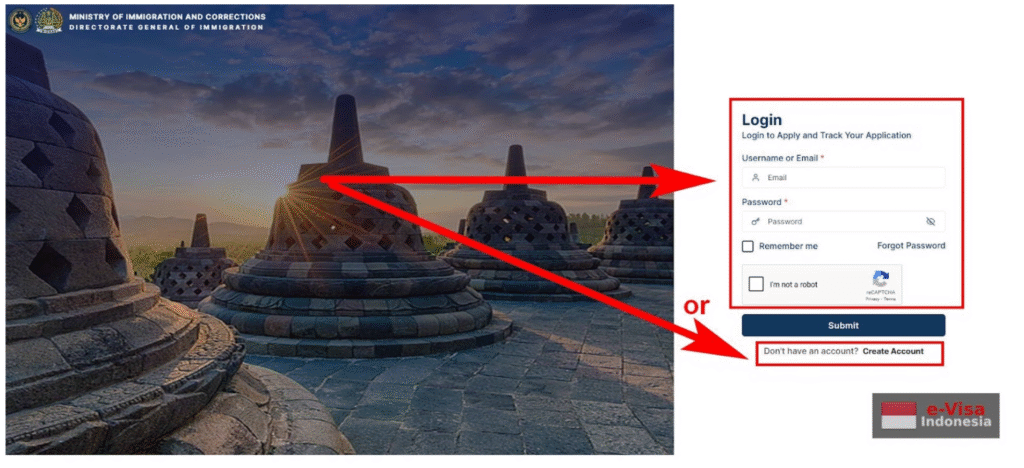
- Complete the registration form accurately and click “Submit”.
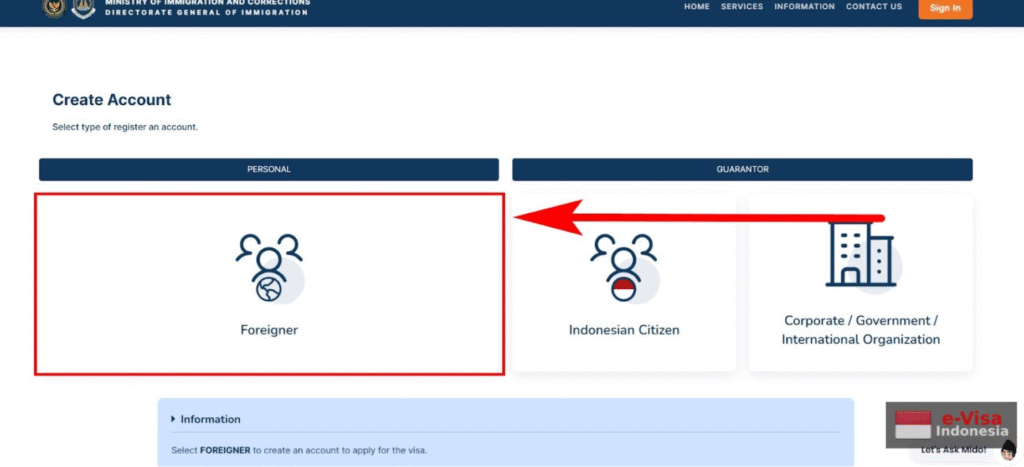
- Make your payment using Visa, Mastercard, or JCB within 2 hours.
- Allow up to 5 business days for processing; check progress via your account.
- Once approved, download and print the document.
- Carry the printed permit for immigration checks upon entry to Indonesia.
The Japanese should make sure their documents are accurate and up-to-date to avoid any delays in the process. Following the correct procedures will help make the travel to Indonesia hassle-free.
Processing Time of the Visa to Indonesia
Standard processing for an Electronic Visa to Indonesia generally takes around 5 business days.
During peak travel periods or Indonesian public holidays, processing times may be longer, so Japanese visitors are advised to apply in advance to avoid delays.
Other types of Indonesian visas may take several weeks to process due to additional requirements such as supporting documents and background checks, so keep that in mind.
Indonesian Visa: Stay, Validity, and Extensions
Indonesia offers a range of visa types, designed to suit different purposes of travel, durations of stay, and entry requirements.
Each visa type has different rules and conditions, such as how long you can stay, whether you can enter once or multiple times, if extensions are allowed, and whether you can apply for another permit while in the country.
For example, the B1 visa allows Japanese citizens a stay up to 30 days in Indonesia and offers a single-entry option. This visa can be extended once for an additional month, providing flexibility for short-term visitors.
Generally, Indonesian visas are non-convertible, meaning they cannot be changed to other permit types while in Indonesia.
Entry Requirements to Indonesia
Travelers from Japan must meet entry requirements stated by the Indonesian law to ensure compliance with immigration regulations.
To enter Indonesia, Japanese citizens must provide the following at immigration checkpoints:
- Passport: Must be valid for at least 6 months after arrival and have at least 2 blank pages.
- Visa: Needed to visit Indonesia.
- SATUSEHAT Health Pass: An electronic self-declaration form to be filled out before entry.
- Proof of yellow fever vaccination: Required if arriving from a country with yellow fever transmission risk.
- Tourist levy payment proof (for Bali): Receipt or confirmation of payment of the 150,000 IDR tourist levy (can be paid online or on arrival).
- Police registration (if staying in private accommodation): Must report the stay to the nearest police station.
Preparing the necessary documents in advance and staying informed about current rules will help avoid delays or complications during the trip, ensuring a smoother experience for Japanese travelers.
Indonesia Embassy for Japanese Citizens
If you require in-person assistance with visas or additional travel-related services, the Indonesian Embassy in Japan is the best resource.
Japanese citizens can access various services at the Indonesian Embassy in Japan. These include visa application processing, passport-related help, and legalization of documents.
Additionally, the diplomatic mission provides information on travel advisories, handles consular services for lost or expired documentation, and assists with emergency situations involving Indonesian nationals.
- Address: 5 Chome-2-9 Higashigotanda, Shinagawa City, Tokyo 141-0022, Japan
- Email: info@kbritokyo.jp
- Phone: +81 3-3441-4201
FAQs about the Indonesian Visas
- Can I apply for an e-VOA upon arrival in Indonesia?
The e-VOA to Indonesia is an Electronic Visa issued before arrival, and you should obtain it beforehand to enter the country.
- Is proof of accommodation required for the visa application?
Details of where you will stay, such as hotel reservations, may be required during the application process for an Indonesian visa.
- Can the Tourist eVisa be used for working in Indonesia?
The Tourist eVisa is strictly for tourism travel, not for employment purposes. You’ll need a different visa to work in Indonesia.
- What happens if I overstay my Indonesian visa?
Overstaying in Indonesia incurs a fine of IDR 1,000,000 (approximately $65) per day. Fines are to be settled before departure.
- Can I switch my e-VOA to another visa type while in Indonesia?
Switching types is not possible – Japanese citizens must leave Indonesia and reapply for the appropriate visa.
- Do children need separate Indonesian visas?
Yes, all Japanese travelers, including minors, require their own individual visas to enter Indonesia.
Conclusion
Going to Indonesia requires careful preparation, particularly when it comes to visa rules. Understanding the specifics of the permits, including eligibility and application procedures, is crucial for a smooth entry into the country.
It’s important to note that each Japanese traveler, regardless of age, must have their own visa and a passport to enter Indonesia.
For more detailed information regarding visa conditions, Japanese nationals are encouraged to contact the Indonesian Embassy or Consulate in their region.
Sources
Hi, I’m Kartini Sisingamaraja! I’m an Indonesian travel blogger and a migration and visa expert with years of experience, including working for Indonesia’s Ministry of Immigration and Corrections. Traveling is my passion, and I love sharing my adventures, tips, and insights to help others explore the world with ease. Whether you’re looking for hidden gems in Indonesia or need guidance on visas and migration, I’m here to make your journey smoother and more exciting. Let’s explore together!




